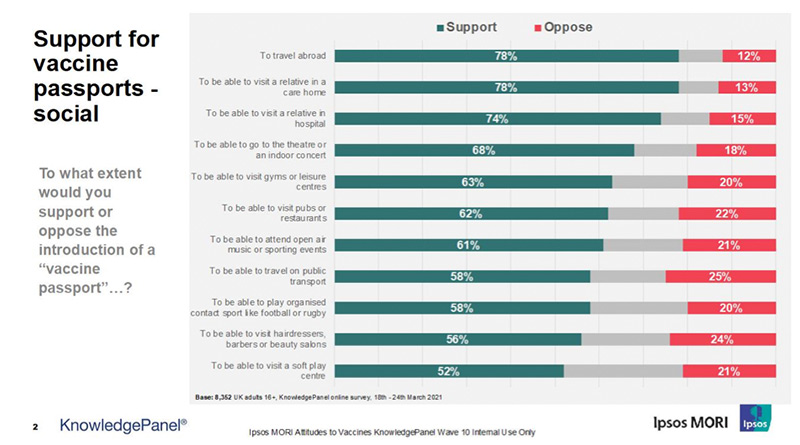Majority Of Britons Support Vaccine Passports But Recognise Concerns Says Poll

New survey shows significant support for vaccine passports however, some are concerned about the potential issues they could cause.
The Ipsos MORI UK Knowledge Panel poll has found the public support using ‘vaccine passports’ across a range of circumstances. There is particularly strong support for their use for people who are travelling abroad (78%), for visiting relatives in hospitals (74%) or care homes (78%). Seven in ten say they should be needed to go to the theatre or an indoor concert (68%), while six in ten support needing one to go to the pub or eat out in a restaurant (62%), or to go to the gym (63%).
Support for vaccine passports-social
Social Britons also want to see vaccine passports being a requirement for certain jobs. For example, eight in ten say that they should be required to work on the frontline in the NHS or care sector (79%), seven in ten say the same about teaching (69%), and two thirds think they should be needed to work as a tradesperson in people’s homes (66%), in a restaurant or pub (65%), or in a supermarket (63%).
Support for vaccine passports – work
While Britons recognise some of the ethical or legal issues surrounding vaccine passports, six in ten think the potential benefits to the economy outweigh any concerns (62%). Vaccine passports are seen as critical to getting businesses open (60%), and a good alternative to lockdowns (61%). They are also seen as a useful means of encouraging people to get vaccinated (61%). Britons also suggest they may ‘vote with their feet’; for example, 65% say they would be more likely to buy a ticket for a large public event if they knew that vaccine passports were in use there, and 59% say they would be more likely to employ a plumber with a vaccine passport than one who had not been vaccinated.
However, there are some notes of caution in the findings. One in five think the ethical and legal concerns outweigh any potential benefits to the economy (22%), and half say that vaccine passports may lead to inequalities (52% agree that they will lead to an unequal society by restricting what people who haven’t received the vaccine can do).
There are also important differences by age, ethnicity and deprivation. For example, younger people, ethnic minority Britons, and those in more deprived areas express more concern about the legal and ethical issues, and are less likely to support their use. These groups have seen the lowest levels of vaccine confidence.
Kelly Beaver, Managing Director of Public Affairs at Ipsos MORI said: “Our UK Knowledge Panel findings show that the public are once again prepared to do what it takes to get out of this pandemic. While they recognise the issues around vaccine passports, particularly their potential to exacerbate existing inequalities, their potential importance to ending lockdown and reopening the economy has won the argument for the majority of the British public.”
